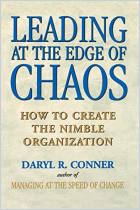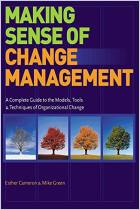
Managing at the Speed of Change
How Resilient Managers Succeed and Prosper Where Others Fail
ISBN: 9780679406846
Pages: 320
Recommendation
In part because author Daryl R. Conner applies common sense ideas, and in part because his ideas have spread throughout corporate culture, some aspects of this book may seem familiar. Conner would probably count that as a positive development, because one of his core premises is that change is exhausting and, therefore, you should try to make changes as palatable as possible to the people they will affect. Thomas Edison did this by making the first electric lights resemble the already-familiar gas fixtures. But even if you’ve heard all of this before, don’t underestimate the book’s usefulness. Conner’s theories may not surprise you, but he offers many immediately applicable tools for dealing with change, and he uses clear, expressive language to do so. Because you’ll learn several useful tips if you read even a few pages, getAbstract recommends this book to anyone guiding any kind of organization – family, nonprofit, business or school – through change.
Summary
About the Author
Daryl R. Conner has been working as a consultant in the field of change management for 30 years. He is the author of Leading at the Edge of Chaos.



















Comment on this summary